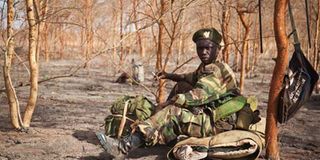Uganda warns Sudan over attacking Juba

A soldier of the South Sudan People’s Liberation Army (SPLA) waits among acacia trees at the frontline north of Heglig, days before the town fell to SPLA forces. Uganda’s army chief Gen. Aronda Nyakairima has said Kampala will intervene if the conflict between north and south Sudan escalates into a full-scale war.
What you need to know:
We shall intervene. Army chief Gen. Aronda says reports that LRA rebels have made contact with Khartoum, coupled with lessons from the past, will push Kampala to pull the trigger.
The Chief of Defence Forces, Gen. Aronda Nyakairima, has said Uganda will be forced to intervene if the fighting between South Sudan and Sudan escalates into a full-scale war.
Gen. Aronda said the UPDF also has intelligence information that Khartoum was “again making contacts” with the Lord’s Resistance Army rebels, whom he said have moved towards Bahr-el- Gazel.
“We will not sit by and do nothing. We will be involved having suffered a proxy war by Khartoum. Our people in northern Uganda suffered and intelligence information also indicates that the LRA, who have an estimated 200 guns, are again in contact with Khartoum,” he said.
Gen. Aronda was on Wednesday night presenting a paper on the role of African militaries in promoting peace and security in East Africa and the Horn of Africa to a meeting of military generals and other security experts from Kenya, Uganda and Ethiopia in Kampala.
His comments appeared to confirm previously unverified reports that the militaries of some Great Lakes region countries have been mobilised in preparation for what could turn out to be Africa’s next war, this time pitting parts of Black Africa against a Khartoum-led Arab coalition.
There are security reports saying the LRA, who were previously hiding in the forests of Obo, Central African Republic, have moved to Northern CAR near the Sudan border, sparking fears that the Ugandan rebels could be about to be re-injected into a conflict which for decades had Uganda and the Islamic regime locked in mortal proxy combat.
Gen. Aronda told his colleagues from Kenya and Ethiopia to come up with a position on the fighting which has broken out between the two countries.
South Sudan is Uganda’s biggest export trading partner and if the fighting escalates to all-out warfare, the country is likely to lose billions of dollars and contend with another humanitarian crisis as refugees stream across the northern frontier.
The bilateral trade between Uganda and South Sudan is highly asymmetric with the volume of exports from Uganda being disproportionately larger than the volume of exports from Sudan to Uganda and largely informal.
There is also flourishing informal trading between communities across the borders.
Gen. Aronda called for an urgent meeting of the Inter-governmental Authority on Development (IGAD), which brings together eight eastern African countries to discuss the fighting that is taking place along the shared border around the oil town of Heglig, which South Sudanese troops captured last week.
The two-day security meeting organised by Advocates Coalition for Development and Environment (ACODE) and International Development Association (IDA) discussed fragility of the security situation in the Horn of Africa.
When asked whether Uganda would be involved militarily, the UPDF spokesperson, Col. Felix Kulayigye, said: “I don’t want to speculate but as a member of IGAD, we shall not sit and watch the Comprehensive Peace Agreement being reversed.”
In 2005, Khartoum signed onto the precursor to Southern Sudan’s independence, the CPA, with the then rebel Sudanese People’s Liberation Army, bringing to an end a conflict which had sucked in Uganda whose northern territories became a proxy fighting field between UPDF and the LRA.
Gen. Aronda’s comments coincide with threats by the Sudanese president Omar al-Bashir to topple the South Sudan government in Juba and “liberate” the south Sudanese.
But hours after Bashir’s threats, Juba announced they had captured another town near the border with the northern neighbour.
The army spokesman, Col. Philip Aguer, said their troops fought off a huge SAF invasion targeting Western Bahr-el-Ghazel State, eventually capturing a spot that SAF has long held in Rajab County in the state.
However, Juba said it was ready for talks with Sudan.
Information minister, Dr Barnaba Marial Benjamin said in statement that they want SAF to withdraw from Abyei, cessation of hostilities, deployment of UN troops as some of the conditions that would enable the southern troops to withdraw from Heglig.
Enemy state
The northern state’s parliament was quick to brand its southern neighbour an “enemy” on Tuesday and called for the swift recapture of the region.
The former deputy Kenyan chief of defence forces, Lt. Gen. John Koech, yesterday told Daily Monitor that the UN has to create a buffer zone to restrain the two countries from engaging in a bloody war.
President Museveni recently told European Union delegates during a meeting at State House in Entebbe that Arab chauvinism is the cause of animosity between the two countries and the marginalisation of people in Nuba, Darfur, Blue Nile and Kordofan states.
Background
The frosty relationship between Uganda and Khartoum in the past years, was largely placed on accusations and counter-accusations between the two states. Whereas Uganda accused Khartoum of backing the Lord’s Resistance Army led by Joseph Kony that wreaked havoc in the north, Sudan on the other hand said Kampala was backing then rebel outfit SPLA, which was fighting for independence of the South. It was the initiation of the CPA, repulsion of LRA and ultimate independence of the South that provided some respite.
Additional reporting by Machel Amos in Juba.



